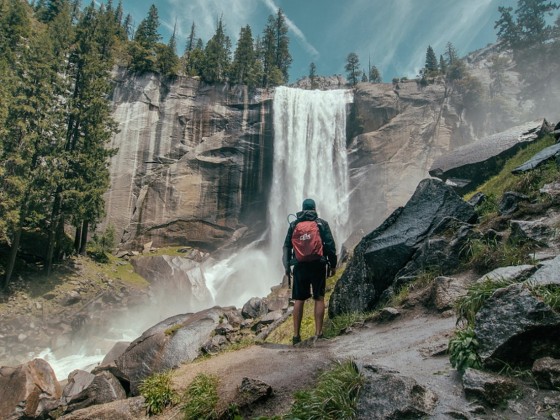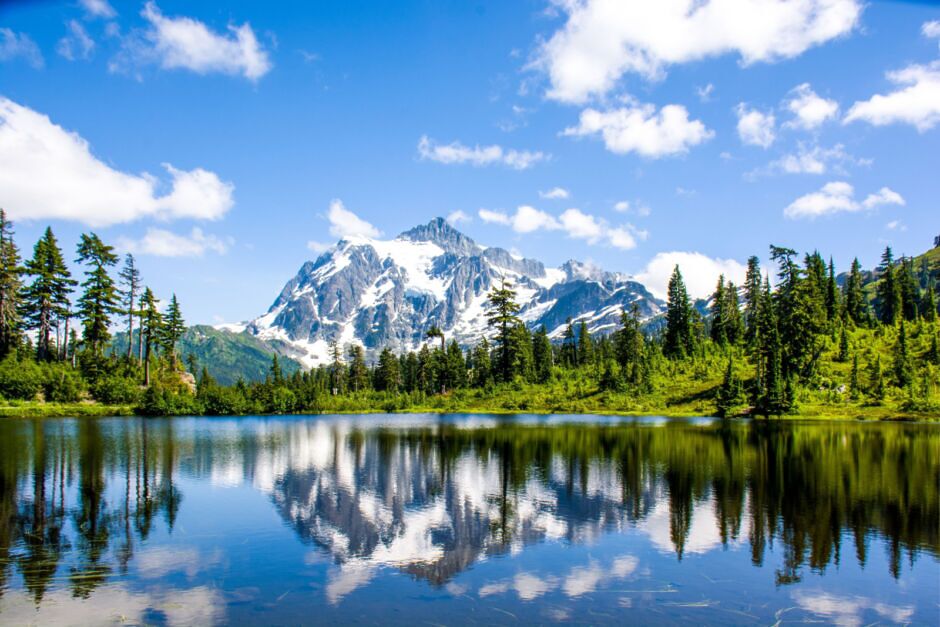2. Zion National Park, Utah
The oldest national park in Utah (est. 1919), Zion is home to almost 300 species of birds, over 70 mammal species, and over 30 species of reptiles in its four distinct “life zones.” Photo by alexfchang.
3. Yellowstone National Park, Wyoming (and Montana and Idaho)
Yellowstone is famous for its geothermal features, including near 1300 geysers that have erupted in the park in its history. Around two-thirds of all the geysers in the world are in Yellowstone. Photo by Dario Bosi.
4. Denali National Park, Alaska
Denali — or, Mt. McKinely — is the highest mountain in North America at 20,321 feet above sea level. Although the park’s summers are short, it can reach around 70F in July. Photo by Gilles Baechler.
5. Grand Canyon National Park, Arizona
“The Grand Canyon fills me with awe. It is beyond comparison—beyond description; absolutely unparalleled through-out the wide world… Let this great wonder of nature remain as it now is. Do nothing to mar its grandeur, sublimity and loveliness. You cannot improve on it. But what you can do is to keep it for your children, your children’s children, and all who come after you, as the one great sight which every American should see.” ~ President Theodore Roosevelt. Photo by Michael Shainblum.
6. Badlands National Park, South Dakota
The Badlands contain one of the richest fossil beds in the world; ancient rhino, horse, and sabre-toothed cats inhabited the area throughout its history. Photo by Jeff Clow.
7. Death Valley National Park, California and Nevada
Besides being the largest national park in the lower 48, it is also the hottest and driest. On July 10, 1913 the thermometer topped 134F (the July average is 115F). Photo by Rob Kroenert.
8. Glacier National Park, Montana
Almost all original native plant and animal species are still found in Glacier National Park, including grizzlies and moose and more endangered species like the Canadian lynx and wolverines. Photo by Jeff Clow.
9. Katmai National Park, Alaska
Katmai is home to the largest population of protected brown/grizzly bears (around 2200). Salmon-spawning season is a popular time to visit to view the bears feeding at Brooks Falls. Photo by Marco Gaiotti.
10. North Cascades National Park, Washington
With 312 glaciers, North Cascades has the most glaciers of any US park outside of Alaska.
11. Everglades National Park, Florida
Everglades National Park is the largest tropical wilderness in the US and is declared an International Biosphere Reserve, a World Heritage Site, and a Wetland of International Importance, one of only three areas in the world to be included on all three lists. Photo by Sterling Lanier.
12. Acadia National Park, Maine
The oldest national park east of the Mississippi, its 47,000 acres include mountains, beaches, forests, and lakes. Photo by Gautam Phookan.
13. Grand Teton National Park, Wyoming
Popular for outdoor recreation, Grand Teton National Park has over 1000 drive-in campsites and 200-plus miles of hiking trails for backcountry access. Photo by Jeff Clow.
14. Arches National Park, Utah
There are over 2000 natural sandstone arches in Arches National Park. Since 1977, 43 are known to have collapsed. Photo by Marsel van Oosten.
15. Great Smoky Mountains, North Carolina and Tennessee
This UNESCO World Heritage Site is one of the largest protected areas in the eastern US. The oldest rocks in the park were formed over a billion years ago. Photo by Frank Kinser.
16. Olympic National Park, Washington
Located on the Olympic Peninsula, the park is true sea-to-sky territory: miles of rugged coastline, glaciated mountains, and temperate rainforests. Photo by Gert Hofer.
















